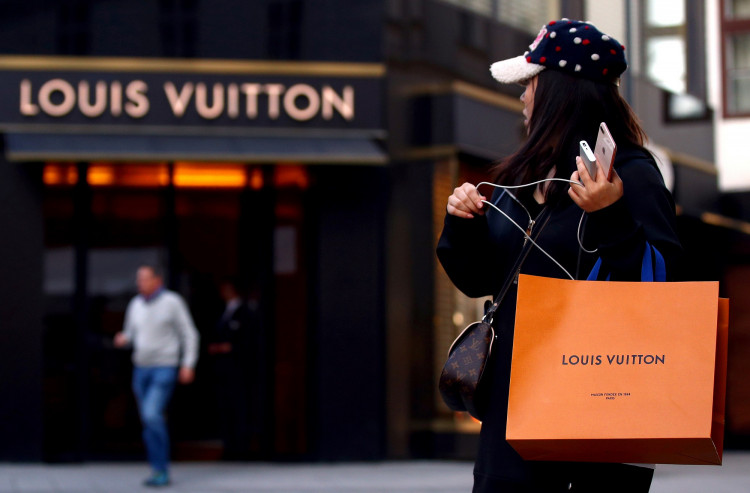LVMH Moët Hennessy Louis Vuitton SE, the world's largest luxury conglomerate, reported a 3% drop in third-quarter sales, undershooting market expectations as demand for high-end products in China and Japan weakened significantly. The Paris-based company, widely regarded as a barometer for the global luxury industry, posted revenue of 19.08 billion euros ($20.8 billion) for the quarter ending in September, missing analysts' forecasts of modest growth.
This marks LVMH's first quarterly decline in sales since the global pandemic disrupted markets in 2020. The weaker-than-expected performance has raised investor concerns, with the company's shares and those of its peers seeing declines. "LVMH being the sector proxy for many, this print will inevitably cause more short-term volatility," said Flavio Cereda, co-manager of GAM's Luxury Brands investment strategy.
The company's flagship fashion and leather goods division, home to iconic brands such as Louis Vuitton and Christian Dior, suffered a 5% drop in sales, significantly below market expectations of 4% growth. This marks the first decline in the division since the pandemic and highlights the challenges facing the luxury sector as it navigates a cooling post-pandemic economy.
LVMH's Chief Financial Officer Jean-Jacques Guiony pointed to weakening consumer confidence in China, a crucial market for the luxury giant. "Consumer confidence in mainland China today is back in line with the all-time low reached during Covid," Guiony noted during an earnings call. He added that the company remains committed to the Chinese market despite the current challenges.
The slowdown comes as a blow following weeks of market optimism, fueled by China's stimulus measures aimed at reviving its economy. However, the impact of these measures has yet to materialize fully in the luxury sector, as ongoing concerns over China's economic growth and property crisis continue to dampen consumer enthusiasm. The luxury sector's hopes of a quick rebound have been dashed as Chinese shoppers, once known for their insatiable appetite for high-end products, are now holding back.
Luxury stocks have been on a rollercoaster in recent weeks. Following LVMH's disappointing earnings report, its American depositary receipts fell as much as 10%. The downturn also affected shares of other luxury brands, including U.S. competitors like Ralph Lauren Corp. and Estee Lauder Cos., as well as ADRs of Gucci's parent company, Kering SA.
Guiony highlighted the challenges facing not just China but other major markets, including Japan, where growth sharply slowed to 20% from a 57% surge in the previous quarter. The yen's strength has dampened spending by Chinese tourists, who have traditionally traveled to Japan to purchase luxury goods. The slowdown in Japan underscores the broader difficulties faced by LVMH in its key Asian markets.
In Asia, excluding Japan, LVMH's sales fell by 16%, a more significant drop than the 14% decline in the previous quarter. This deterioration reflects ongoing struggles to regain the momentum lost during the pandemic. As Chinese shoppers tighten their spending, LVMH, like other luxury companies, is finding it challenging to adapt.
The broader luxury sector is feeling the pressure as well. UBS had already forecasted that the third quarter would be the worst for the luxury market in four years, predicting a 1% decline in organic sales year-on-year. Analysts are now revising their expectations following LVMH's results, with many bracing for further volatility as other luxury brands, such as Hermès International SCA, prepare to report their earnings in the coming weeks.
Bernstein analyst Luca Solca described LVMH's third-quarter results as "a miss across the board," signaling that the company's challenges are not confined to one segment. The luxury giant's diverse portfolio, which spans fashion, jewelry, hospitality, and spirits, saw underperformance in multiple categories, highlighting the widespread nature of the current downturn.
LVMH's dominant fashion and leather goods division, which accounts for nearly half of the company's revenue and approximately three-quarters of its recurring profit, has been particularly affected. The post-pandemic spending spree that buoyed luxury brands last year has lost momentum, and China's ongoing property crisis has further dampened consumer confidence.
Despite the struggles, Guiony expressed cautious optimism about China's market potential, pointing to the Chinese government's recent stimulus efforts as a sign that authorities are serious about tackling economic issues. "It shows that they are taking the issue very seriously," he said, though he admitted that it remains difficult to assess how quickly these measures will impact demand for luxury goods.
European and U.S. markets, which had previously shown resilience, also disappointed in the third quarter. The cooling of a pandemic-era luxury spending boom, particularly among aspirational customers in the West, has started to weigh on LVMH's performance. Meanwhile, the most exclusive luxury brands, such as Hermès, have so far proven more resistant to the slowdown, but analysts caution that even these top-tier brands could feel pressure if the global economic environment does not improve.
Bernard Arnault, CEO of LVMH and one of the world's wealthiest individuals, faces the challenge of steering the company through this period of uncertainty. While LVMH's diversified portfolio has helped it weather past economic storms, the depth and breadth of the current global challenges may test its resilience.





